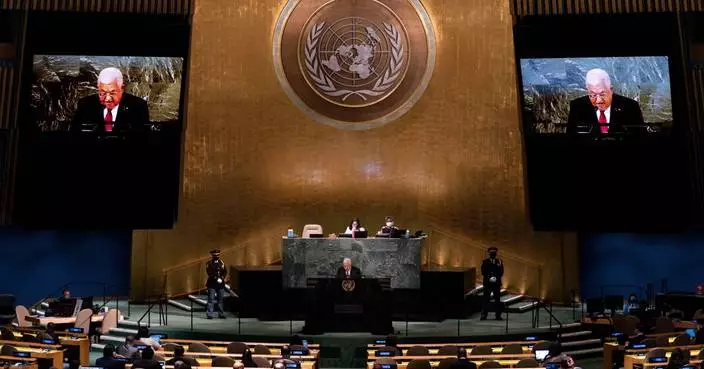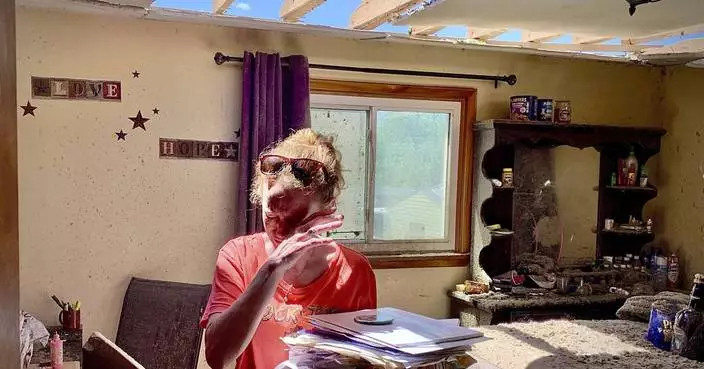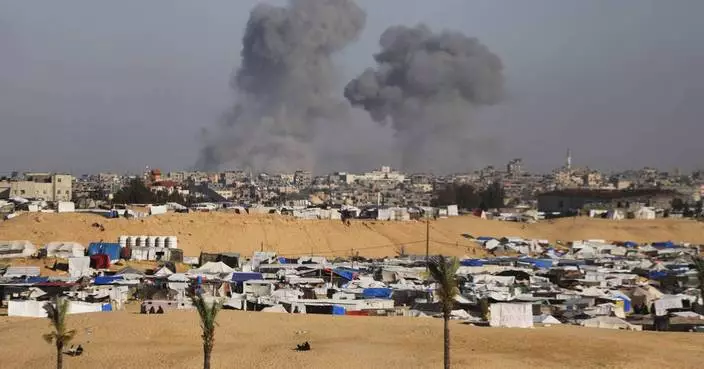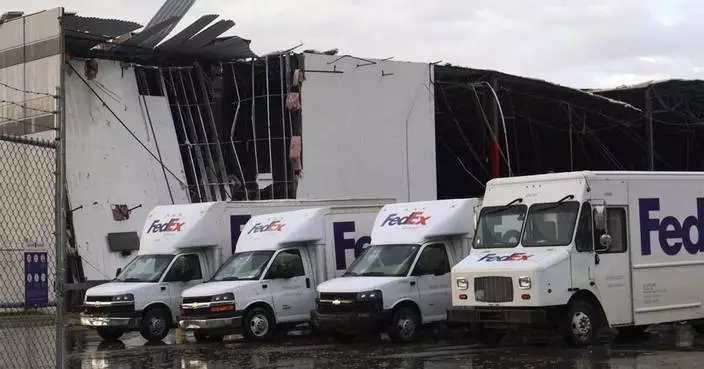Can someone as notorious in the #MeToo era as Harvey Weinstein get a fair trial in the world's media capital?
That's one of the legal questions looming over the sexual assault case against the movie mogul with jury selection scheduled for early next month.
Weinstein's lawyers want the trial moved from New York City to Long Island or upstate New York — part of the last-minute wrangling that includes efforts by prosecutors to bolster their case with testimony from actress Annabella Sciorra, who says Weinstein raped her in the 1990s. Weinstein has denied all accusations of non-consensual sex.
The maneuvers have the potential to cause further delays in an already fitful prosecution.
Some of the uncertainty could be cleared up Monday, when Weinstein is due to be arraigned on a new indictment, and an appeals court is expected to rule on a defense motion for a change of venue that prosecutors oppose.
Such motions are rarely granted. But defense lawyers argue the court should make an exception in Weinstein's case, given a "circus-like atmosphere" and "hysteria" fueled by news reports and social media posts. In court papers, they noted that their client's name was mentioned online on the New York Post's gossip column Page Six more than 11,000 times.
"It is safe to say that New York City is the least likely place on earth where Mr. Weinstein could receive a fair trial, where jurors could hear evidence, deliberate and render a verdict in an atmosphere free of intimidation from pressure to deliver a result that the politicians, the activists, the celebrities and the media demand," the lawyers wrote in court papers.
But "the publicity will be suffocating" wherever the case is tried, said Jeffrey Lichtman, a high-profile New York City attorney who is not part of the case.
Lichtman, who represented Mexican drug lord Joaquin "El Chapo" Guzman, called the change-of-venue bid misguided because Weinstein, he said, would probably fare better with a jury composed of more "open-minded" Manhattan residents who "might be more sympathetic to the defense that these accusers slept with Harvey with the hope of getting a movie role."
Weinstein, 67, is charged with raping a woman in 2013 and performing a forcible sex act on a different woman in 2006 — both of which he denies.
He faces a maximum sentence of life in prison if convicted on all counts. He is free on $1 million bail.
The new indictment against Weinstein hasn't been made public. But in court papers, prosecutors said it was needed to bring evidence involving Sciorra, best known for her work on "The Sopranos." She claims Weinstein raped her inside her Manhattan apartment after she starred in a film for his movie studio in 1993.
Prosecutors can't charge Weinstein with the alleged attack because the accusation dates to 13 years before New York eliminated its statute of limitations for rape cases in 2006. But in court papers filed this month, prosecutors told the judge the indictment will give them a legal foundation to call the actress as a witness to strengthen the predatory sexual assault charge against Weinstein. That requires evidence of a history of past sex crimes against women.
Court papers filed by the defense called the attempt to make Sciorra a prosecution witness an "11th-hour maneuver" that "raises significant legal issues" that could delay the trial by several weeks.
The actress is among the dozens of women who have leveled accusations against Weinstein in accounts published by The New York Times, The New Yorker and other outlets.
The Associated Press generally does not name people who say they are victims of sexual assault, but Sciorra went public with her story in a story in The New Yorker in October 2017.
She told the magazine she didn't report the assault at the time because, even though she tried to fight off Weinstein, she believed she was to blame. Prosecutors said she didn't speak with them until after Weinstein's arrest in May 2018.
"Like most of these women, I was so ashamed of what happened," she said. "I felt disgusting."
Follow Hays at twitter.com/aptomhays and Sisak at twitter.com/mikesisak
DUMA, West Bank (AP) — Charred homes and cars dotting this hilltop village surrounded by olive groves are a searing reminder of Palestinians' vulnerability to rising violence from Israeli settlers.
The trail of wreckage along Duma's main road is the aftermath of a three-hour attack in mid-April that left 15 homes damaged by arson and six residents injured by bullets, the head of its village council said. It was one of nearly 800 settler attacks against Palestinians in the occupied West Bank since Hamas attacked Israel from the Gaza Strip on Oct. 7, according to the U.N.
The burnt remains in Duma also highlight the village's limited resources to clean up and rebuild, let alone defend itself from future incursions, which seem inevitable as gun-toting settlers patrol the area roughly 20 miles (30 kilometers) north of Jerusalem.
“We as the village of Duma ... do not have the power to defend ourselves,” said Suleiman Dawabsha, chairman of the village council for this community of more than 2,000 people. He estimated the attack caused five million shekels ($1.3 million) in damage.
The rampage on April 13 echoed a similar event that took place almost a decade ago. In 2015, three Palestinians from Duma were killed, including an 18 month-old baby, after settlers fire-bombed a home there. An Israeli man was later convicted for murder.
The latest attack against Duma was part of a wave of settler violence touched off by the death of a 14-year-old Israeli who went missing on the morning of April 12. Authorities found his body the next day and they have arrested a man from Duma who they say was connected to the boy's alleged murder.
On April 15, two days after the attack in Duma, two Palestinians were shot dead by settlers near the town of Aqraba, according to the Palestinian Health Ministry. And in a related spurt of violence, a man was killed by Israeli fire on April 12 in nearby al-Mughayyir, though it remains unclear whether the fatal bullet was fired by a soldier or settler.
There have been 794 settler attacks against Palestinians in the West Bank since Oct. 7 — from stones thrown at passing cars to bullets fired at residents, according to the United Nations Office for the Coordination of Humanitarian Affairs. At least 10 Palestinians have been killed by settlers in these attacks, it said.
Attacks by settlers aren't the only form of violence on the rise in the West Bank.
Since the war in Gaza began, nearly 500 Palestinians have been killed by Israeli fire in the territory, according to the Health Ministry based in Ramallah, which says the overwhelming majority have been shot dead by soldiers. Palestinians in the West Bank have killed nine Israelis, including five soldiers, since Oct. 7, according to U.N. data.
The war has undoubtedly heightened tensions between settlers and Palestinians. But Israeli human rights groups blame the far-right government of Prime Minister Benjamin Netanyahu for fueling settler violence by promoting an ideology of total Israeli supremacy in the West Bank.
These groups say the Israeli army doesn't do enough to stop the violence, and even facilitates it in some cases by offering the settlers protection. The Israeli army said in a statement it tries to protect everyone living in the West Bank and that complaints about soldiers are investigated.
No one was killed in the attack on Duma, but residents described narrow escapes.
Ibrahim Dawabsha, a truck driver and father of four, said most of his family hid in the kitchen as settlers launched firebombs and set part of their home ablaze.
“My daughter was at her uncle’s house, there was no one there,” he said. “What they (might) do to her I don’t know.”
The heads of Duma and al-Mughayyir said Israeli troops arrived shortly after the attacks on their communities began but did little to intervene. Instead, they fired at Palestinians attempting to confront the settlers, these officials said.
A prominent Israeli human rights group, Yesh Din, described it as an “umbrella of security” — a collaboration it says has become increasingly common since Israel's right-wing coalition government came to power in late 2022.
“As soon as the Palestinians try to protect themselves, they’re the ones who the army attacks,” said Ziv Stahl, Yesh Din’s director.
The United States has increased pressure on Israel to curb settler attacks in the West Bank, sanctioning some leaders, including a close ally of Israel's far-right national security minister, Itamar Ben-Gvir.
Dawabsha, the chief of Duma, does not believe the pressure campaign will be effective. “I am not pinning my hopes on the American government,” he said.
Israel captured the West Bank, east Jerusalem and Gaza in the 1967 Mideast war, territories Palestinians want as part of a future state. Settlers claim the West Bank, home to some 3 million Palestinians, is their biblical birthright.
Around 500,000 Israeli settlers live across hundreds of settlements and outposts in the West Bank. These segregated and tightly guarded communities vary in size and nature. Larger settlements are akin to Jerusalem’s sprawling suburbs, while smaller unauthorized outposts can consist of just a few caravans parked on a hilltop.
Outposts often receive tacit government support and sometimes they gain formal recognition — and receive funding — from the Israeli government.
Duma's geography makes it uniquely vulnerable to attack.
Overlooking Jordan and Israeli settlements to the east, the village is surrounded more closely by at least three outposts that the head of its council says have expanded gradually over the past decade. Duma is in a section of the West Bank known as Area B: Its civil affairs are governed by the Palestinian Authority, but the Israeli military is in charge of its security.
Palestinians largely consider the PA to be ineffective and corrupt, and it rarely opposes Israel's military operations in the territory.
Over the past year, settlers have cut off Duma's access to four vital springs and wells that surround the village by sabotaging roads and other infrastructure, according to residents.
In the days following Hamas' Oct. 7 attack on southern Israel, more than 100 Bedouin Arabs that were living a nomadic lifestyle in the pastures south of Duma relocated to its fringes in search of greater safety and resources.
One of them, Ali Zawahiri, said his extended family relocated after settlers had begun burning their tents and stealing their livestock in apparent revenge attacks. The Bedouin Arabs living near Duma are one of 16 such communities in the West Bank that have relocated because of settler violence or threats since the start of 2023, according to Yesh Din.
"He is armed with a gun and I am just a person with nothing,” Zawahiri said.
An armed unit run by the Palestinian Authority that formerly patrolled the perimeter of West Bank towns at night halted operations shortly after the Gaza war broke out, when members of the force were kidnapped by settlers.
When asked how they might better defend themselves in the future, residents of Duma struggled to answer.
“What preparations?" said Ibrahim Dawabsha, whose truck — his main source of income — was burnt to ashes. "There are no preparations.”
Associated Press video journalist Imad Isseid contributed to this report.
This story has been corrected to show that some 3 million Palestinians live in the West Bank. An earlier version said there were 2,000.
Follow AP's coverage at https://apnews.com/hub/israel-hamas-war
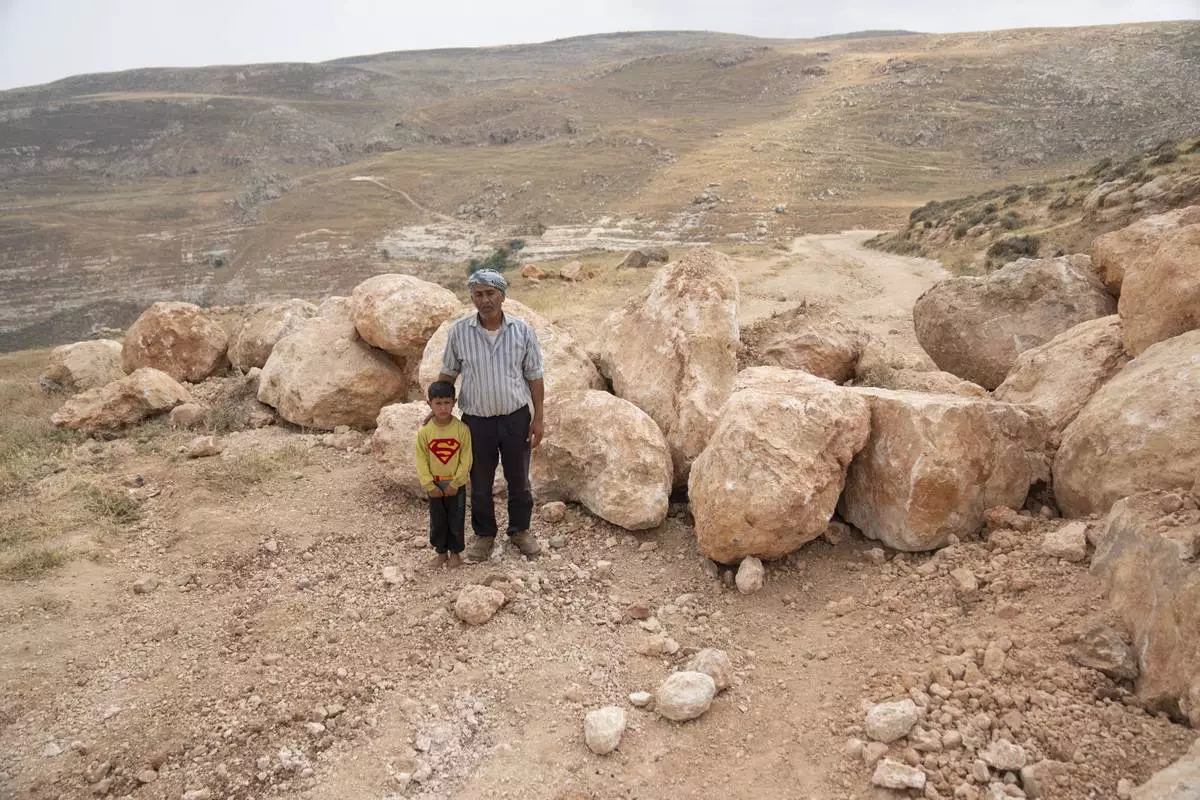
Bedouin Khaled Arara, 54, and his son Ali, 7, pose for a picture on the road leading to his hamlet that was closed with rocks by Israeli settlers, Tuesday, April 30, 2024. (AP Photo/Nasser Nasser)

A Bedouin man attends his herd after he fled his home following a wave of attacks by Israeli settlers, Tuesday, April 30, 2024. (AP Photo/Nasser Nasser)

An Israeli settlers' outpost on a hilltop, right, is seen from outskirts of the West Bank town of Duma, Tuesday, April 30, 2024. (AP Photo/Nasser Nasser)

Bedouins fled their homes on the far hillside seen in the background following a wave of attacks by Israeli settlers, Tuesday, April 30, 2024. (AP Photo/Nasser Nasser)
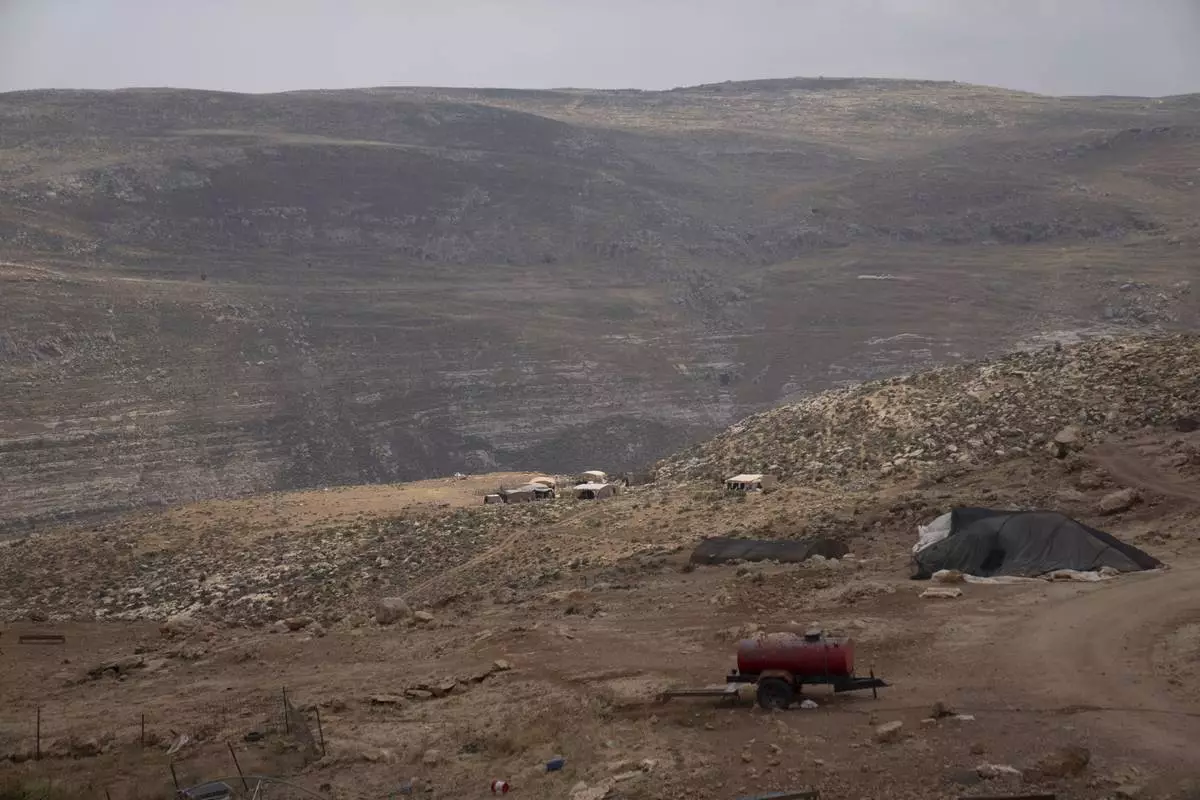
Bedouins fled their homes on the far hillside seen in the background following a wave of attacks by Israeli settlers, Tuesday, April 30, 2024. (AP Photo/Nasser Nasser)
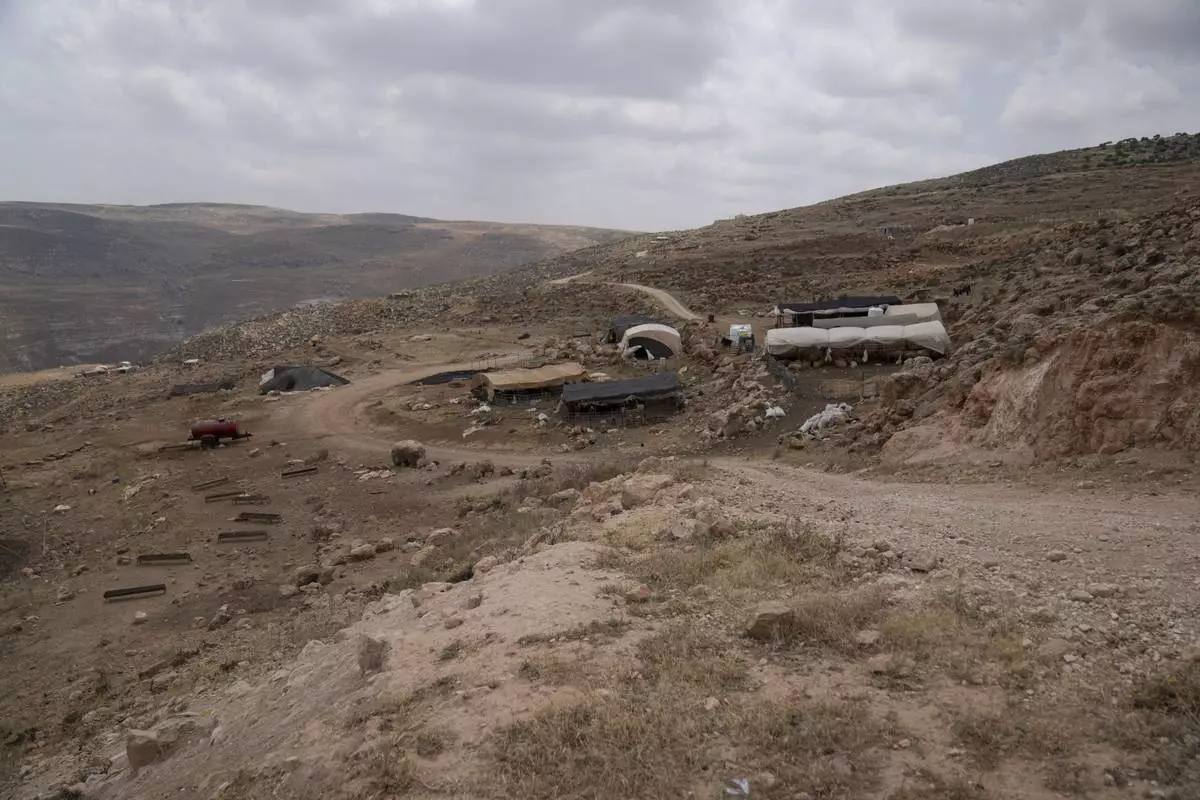
A Bedouin man fled his home on the far hillside seen in the background following a wave of attacks by Israeli settlers, Tuesday, April 30, 2024. (AP Photo/Nasser Nasser)
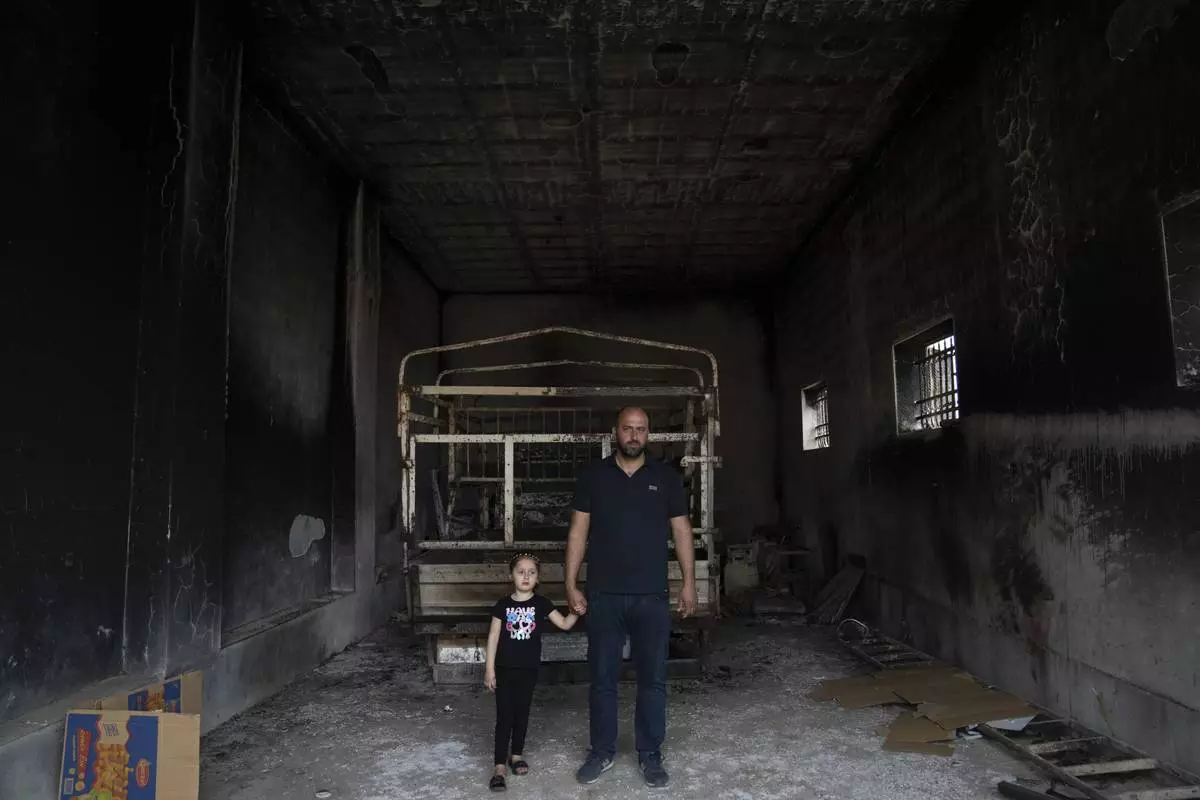
Ibrahim Dawabsha, 34, holds hands with his daughter Ghena, 3 while posing for a picture in front of his truck, at the garage of the family house, that was torched during an attack by Israel settlers last month, in the West Bank village of Duma, Tuesday, April 30, 2024. (AP Photo/Nasser Nasser)
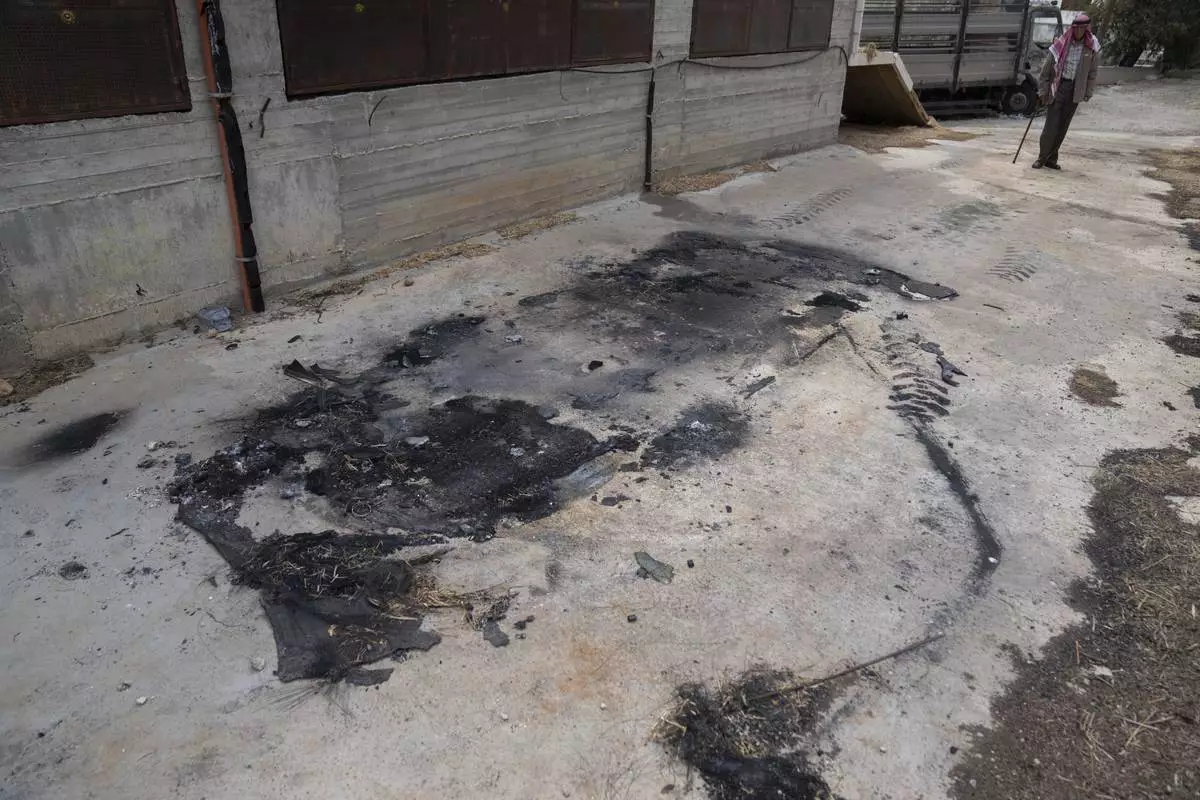
Fathi Dawabsha, 82, walks toward the remains of a family vehicle that was torched during an attack by Israel settlers last month, in the West Bank village of Duma, Tuesday, April 30, 2024. (AP Photo/Nasser Nasser)
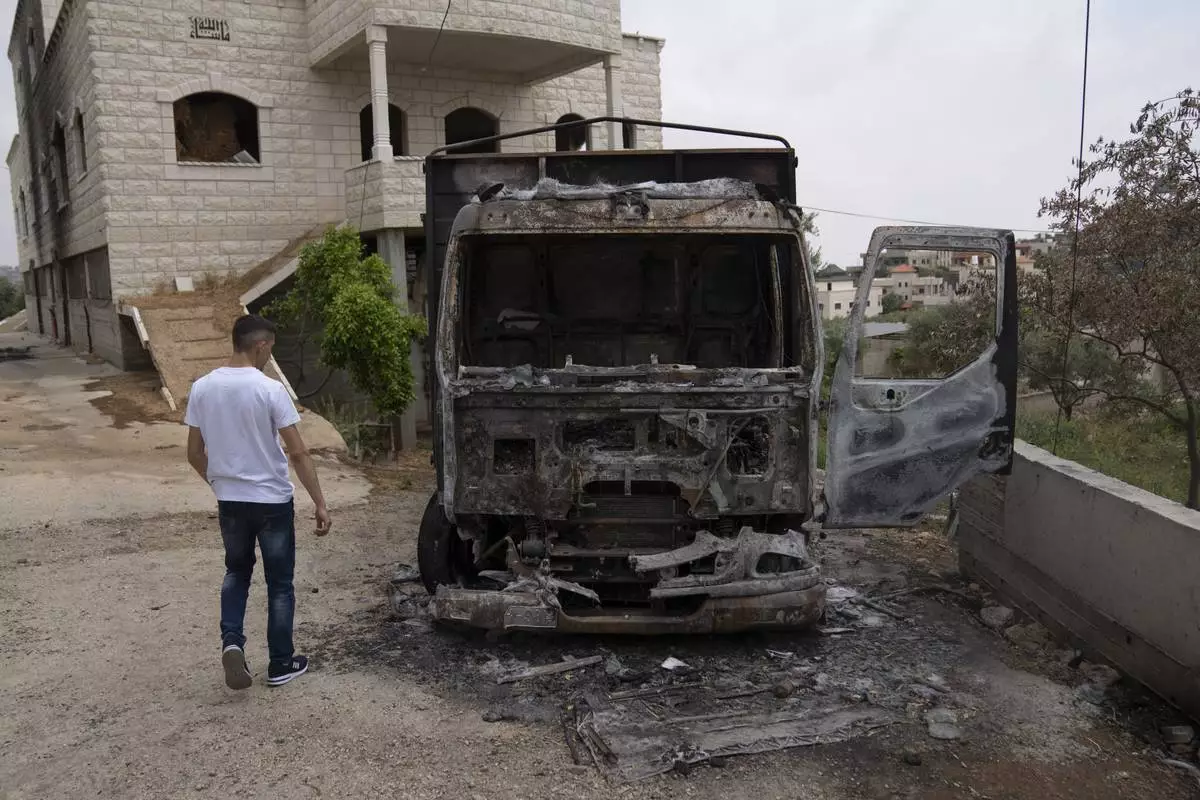
Fatahi Mohammad, 20, walks past his family's truck that was torched during an attack by Israel settlers last month, in the West Bank village of Duma, Tuesday, April 30, 2024. (AP Photo/Nasser Nasser)
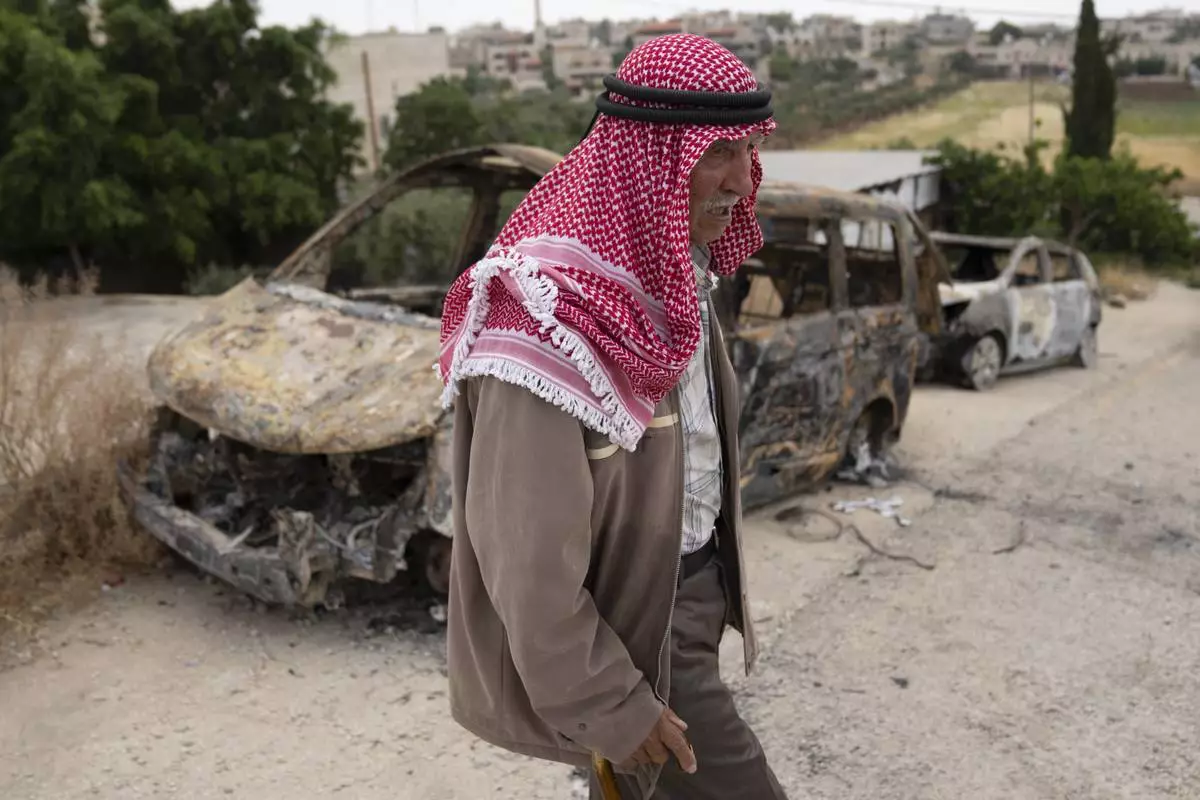
Fatahi Dawabsha, 82, walks past his family's vehicles that were torched during an attack by Israel settlers last month, in the West Bank village of Duma, Tuesday, April 30, 2024. (AP Photo/Nasser Nasser)
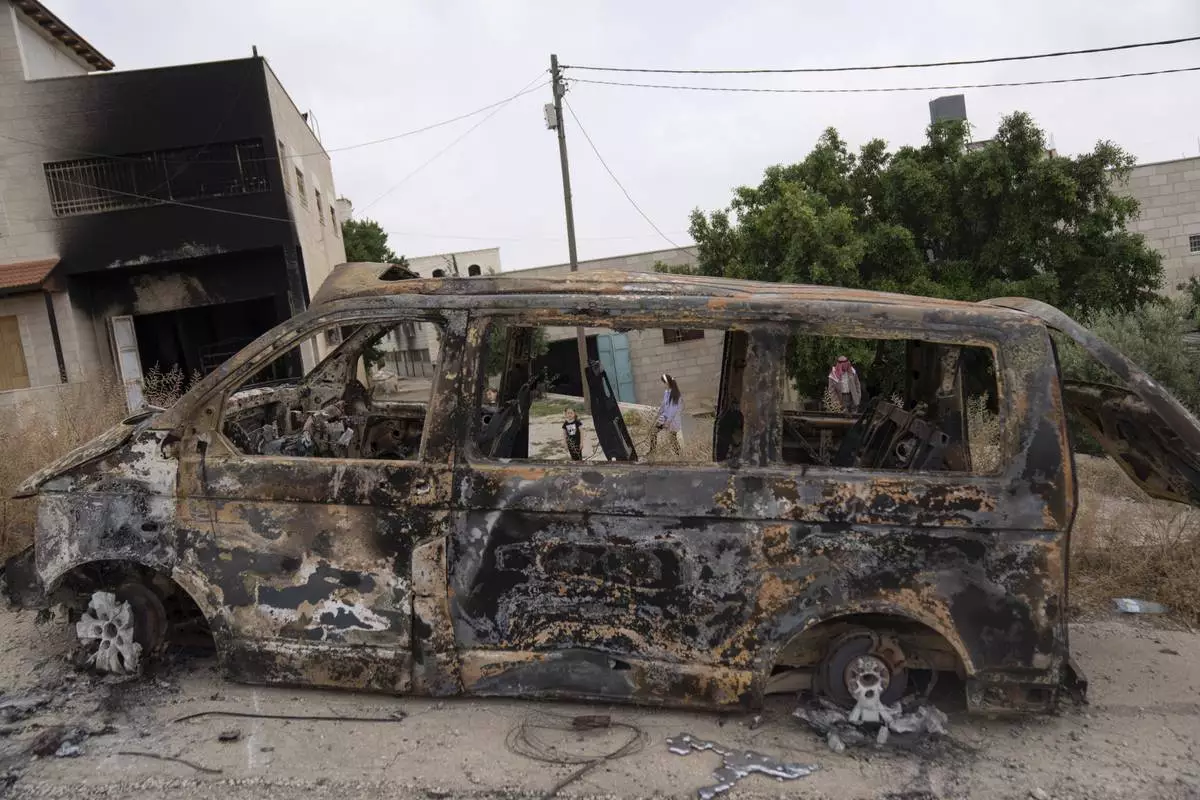
House and vehicles of Ibrahim Dawabsha and his family that were torched during an attack by Israel settlers last month, in the West Bank village of Duma, Tuesday, April 30, 2024. (AP Photo/Nasser Nasser)
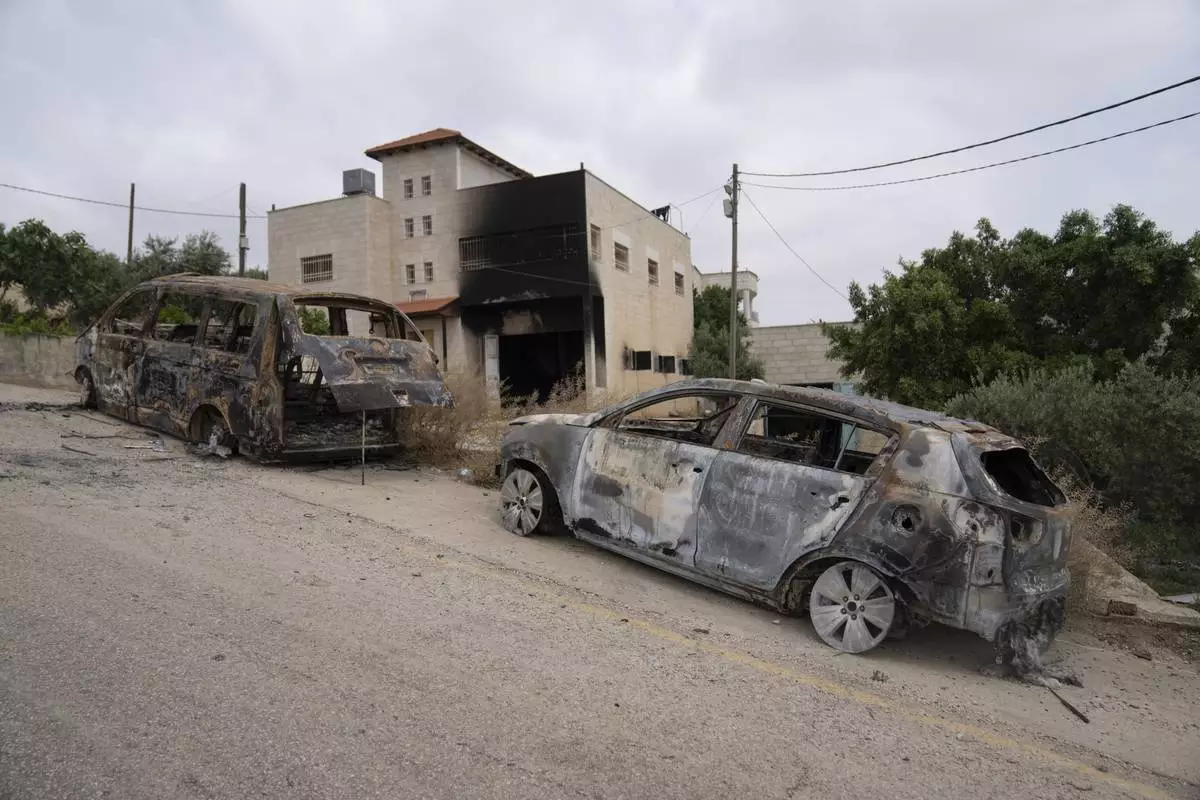
House and vehicles of Ibrahim Dawabsha and his family that were torched during an attack by Israel settlers last month, in the West Bank village of Duma, Tuesday, April 30, 2024. (AP Photo/Nasser Nasser)
















